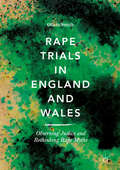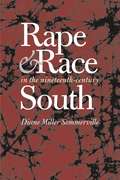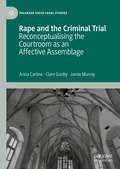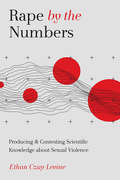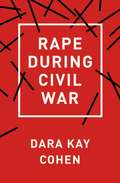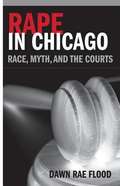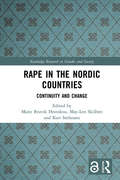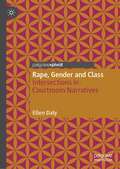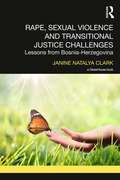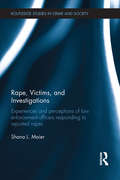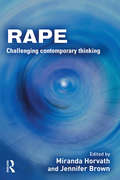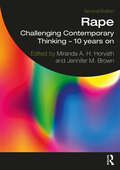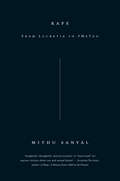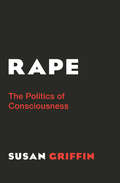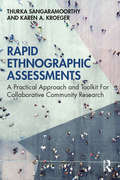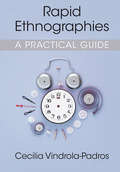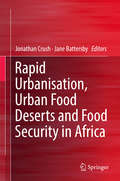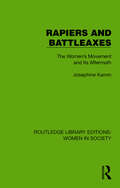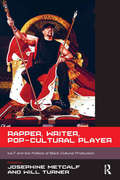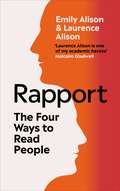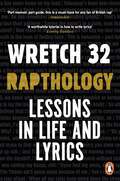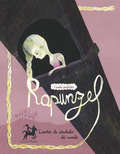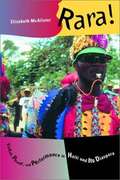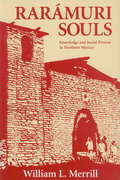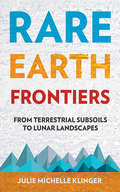- Table View
- List View
Rape Trials in England and Wales: Observing Justice And Rethinking Rape Myths
by Olivia SmithIn light of ongoing concerns about the treatment of survivors, Rape Trials in England and Wales critically examines court responses to rape and sexual assault. Using new data from an in-depth observational study of rape trials, this book asks why attempts to improve survivor experiences at court have not been fully effective. In doing so, Smith identifies deep-rooted barriers to survivor justice and, crucially, introduces potential avenues for more effective reform. This book provides a comprehensive examination of the practicalities of court, use of rape myths and sexual history evidence, underlying principles of adversarial justice and the impact of inequalities embedded within English and Welsh legal culture. This engaging and highly significant study is essential reading for anyone seeking to understand the criminal courts and their responses to rape, including practitioners and students of criminology, sociology, and law.
Rape and Race in the Nineteenth-Century South
by Diane Miller SommervilleChallenging notions of race and sexuality presumed to have originated and flourished in the slave South, Diane Miller Sommerville traces the evolution of white southerners' fears of black rape by examining actual cases of black-on-white rape throughout the nineteenth century. Sommerville demonstrates that despite draconian statutes, accused black rapists frequently avoided execution or castration, largely due to intervention by members of the white community. This leniency belies claims that antebellum white southerners were overcome with anxiety about black rape. In fact, Sommerville argues, there was great fluidity across racial and sexual lines as well as a greater tolerance among whites for intimacy between black males and white females. According to Sommerville, pervasive misogyny fused with class prejudices to shape white responses to accusations of black rape even during the Civil War and Reconstruction periods, a testament to the staying power of ideas about poor women's innate depravity.Based predominantly on court records and supporting legal documentation, Sommerville's examination forces a reassessment of long-held assumptions about the South and race relations as she remaps the social and racial terrain on which southerners--black and white, rich and poor--related to one another over the long nineteenth century.
Rape and the Criminal Trial: Reconceptualising the Courtroom as an Affective Assemblage (Palgrave Socio-Legal Studies)
by Jamie Murray Anna Carline Clare GunbyThis book explores the shortcomings of the criminal justice system’s response to sexual violence. Despite a plethora of legal and policy reforms, concerns remain regarding the conviction rates for rape and the extent to which cases fall out of the system. Ample research has highlighted the ongoing impact of ‘rape myths’ and the presence of an ‘implementation gap’ whereby policies, provisions and measures — proposed in order to improve the system’s response — are frequently not brought into practice, nor utilised as expected. Rape and the Criminal Trial proposes a move beyond representational theory and towards New Materialism and affects, a school of thought which emphasises the importance of embodiment and the ontological intensive regime as necessary in order to generate radical new approaches for understanding this problematic status quo, and in order to move forward to the production of more effective solutions.
Rape by the Numbers: Producing and Contesting Scientific Knowledge about Sexual Violence (Critical Issues in Crime and Society)
by Ethan Czuy LevineScience plays a substantial, though under-acknowledged, role in shaping popular understandings of rape. Statistical figures like “1 in 4 women have experienced completed or attempted rape” are central for raising awareness. Yet such scientific facts often become points of controversy, particularly as conservative scholars and public figures attempt to discredit feminist activists. Rape by the Numbers explores scientists’ approaches to studying rape over more than forty years in the United States and Canada. In addition to investigating how scientists come to know the scope, causes, and consequences of rape, this book delves into the politics of rape research. Scholars who study rape often face a range of social pressures and resource constraints, including some that are unique to feminized and politicized fields of inquiry. Collectively, these matters have far-reaching consequences. Scientific projects may determine who counts as a potential victim/survivor or aggressor in a range of contexts, shaping research agendas as well as state policy, anti-violence programming and services, and public perceptions. Social processes within the study of rape determine which knowledges count as credible science, and thus who may count as an expert in academic and public contexts.
Rape during Civil War
by Dara Kay CohenRape is common during wartime, but even within the context of the same war, some armed groups perpetrate rape on a massive scale while others never do. In Rape during Civil War Dara Kay Cohen examines variation in the severity and perpetrators of rape using an original dataset of reported rape during all major civil wars from 1980 to 2012. Cohen also conducted extensive fieldwork, including interviews with perpetrators of wartime rape, in three postconflict counties, finding that rape was widespread in the civil wars of the Sierra Leone and Timor-Leste but was far less common during El Salvador's civil war.Cohen argues that armed groups that recruit their fighters through the random abduction of strangers use rape--and especially gang rape--to create bonds of loyalty and trust between soldiers. The statistical evidence confirms that armed groups that recruit using abduction are more likely to perpetrate rape than are groups that use voluntary methods, even controlling for other confounding factors. Important findings from the fieldwork--across cases--include that rape, even when it occurs on a massive scale, rarely seems to be directly ordered. Instead, former fighters describe participating in rape as a violent socialization practice that served to cut ties with fighters' past lives and to signal their commitment to their new groups. Results from the book lay the groundwork for the systematic analysis of an understudied form of civilian abuse. The book will also be useful to policymakers and organizations seeking to understand and to mitigate the horrors of wartime rape.
Rape in Chicago: Race, Myth, and the Courts (Women, Gender, and Sexuality in American History)
by Dawn Rae FloodSpanning a period of four tumultuous decades from the mid-1930s through the mid-1970s, this study reassesses the ways in which Chicagoans negotiated the extraordinary challenges of rape, as either victims or accused perpetrators. Drawing on extensive trial testimony, government reports, and media coverage, Dawn Rae Flood examines how individual men and women, particularly African Americans, understood and challenged rape myths and claimed their right to be protected as American citizens--protected by the State against violence, and protected from the State's prejudicial investigations and interrogations. Flood shows how defense strategies, evolving in concert with changes in the broader cultural and legal environment, challenged assumptions about black criminality while continuing to deploy racist and sexist stereotypes against the plaintiffs. Uniquely combining legal studies, medical history, and personal accounts, Flood pays special attention to how medical evidence was considered in rape cases and how victim-patients were treated by hospital personnel. She also analyzes medical testimony in modern rape trials, tracing the evolution of contemporary "rape kit" procedures as shaped by legal requirements, trial strategies, feminist reform efforts, and women's experiences.
Rape in the Nordic Countries: Continuity and Change (Routledge Research in Gender and Society)
by Kari Stefansen May-Len Skilbrei Marie Bruvik-HeinskouWhile the Nordic countries are listed at the top in most international rankings of gender equality and citizens’ feelings of security, studies on the prevalence of sexual victimisation present a different picture, suggesting that the very countries that have invested much in establishing gender equality actually see a high prevalence of sexual violence. This book sheds light on the phenomenon and construction of rape and other forms of sexual violence within the Nordic region, exploring the ways in which rape and sexual violence are dealt with through criminal law and considering governmental policies aimed at combatting it, with a special focus on legal regulations and developments. Thematically organised, it offers new research on perpetrators, victimhood, criminal justice and prevention. Multi-disciplinary in approach, it brings together the latest work from a range of scholars to offer insights into the situation in the five Nordic countries, asking how and why rape and other forms of sexual violence occur, whilst also addressing the timely issues of online sexual cultures, BDSM and the grey areas of sexual offences. As such, it will appeal to scholars of sociology, criminology and law with interests in gender and sexual violence.
Rape, Gender and Class: Intersections in Courtroom Narratives
by Ellen DalyThis book provides a timely analysis of the use of cultural narratives and narratives of credibility in rape trials in England and Wales, drawing on court observation methods. It draws on data from rape and sexual assault trials in 2019 which is used to examine the current status of newly emerging issues such as the use of digital evidence and the impacts of increasing policy attention on rape trials. Drawing on the concept of master narratives, the book provides an examination of rape myths and broader cultural narratives focussing on the intersections of gender and class and it also touches on the intersections of age, (dis)ability and mental health. It emphasizes the importance of situating rape myth debates and sexual violence research within a broader cultural context and thus argues for widening the lens with which rape myths in the courtroom, as well as in the wider criminal justice system, are viewed in research and contemporary debates. The findings presented in this book will help further discussion at a critical time by enabling scholars, as well as practitioners and policymakers, to better understand the current mechanisms that serve to undermine and retraumatise victim-survivors in the courtroom. It seeks to inform further research as well as positive changes to policy and practice.
Rape, Sexual Violence and Transitional Justice Challenges: Lessons from Bosnia Herzegovina
by Janine Natalya ClarkIt is estimated that 20,000 people were subjected to rape and other forms of sexual violence during the 1992–1995 Bosnian war. Today, these men and women have been largely forgotten. Where are they now? To what extent do their experiences continue to affect and influence their lives, and the lives of those around them? What are the principal problems that these individuals face? Such questions remain largely unanswered. More broadly, the long-term consequences of conflict-related rape and sexual violence are often overlooked. Based on extensive interviews with male and female survivors from all ethnic groups in Bosnia-Herzegovina (BiH), this interdisciplinary book addresses a critical gap in the current literature on rape and sexual violence in conflict situations. In so doing, it uniquely situates and explores the legacy of these crimes within a transitional justice framework. Demonstrating that transitional justice processes in BiH have neglected the long-term effects of rape and sexual violence, it develops and operationalizes a new holistic approach to transitional justice that is based on an expanded conception of ‘legacy’ and has a wider application beyond BiH.
Rape, Victims, and Investigations: Experiences and Perceptions of Law Enforcement Officers Responding to Reported Rapes (Routledge Studies in Crime and Society)
by Shana L MaierDespite changes to laws and attitudes, rape continues at epidemic levels worldwide. As gatekeepers to the criminal justice system, law enforcement officers are important to the processing of rape cases and their interactions with victims can potentially affect the victim’s reaction to and recovery from rape. In order to better understand rape and the processing of cases through the criminal justice and legal systems, Rape, Victims and Investigations explores the unique perceptions and experiences of detectives who respond to rape victims and investigate rape cases. The detective’s investigation is the foundation of the prosecution’s case; the book considers factors that contribute to the challenging nature of rape investigations, such as lack of evidence or a clear, credible victim statement. Detectives’ perceptions of victims’ revictimization by the criminal justice and legal systems are also explored. The book also looks at specific causes of police stress and burnout related to working rape cases, financial struggles faced by departments, and ways to meet these challenges. By integrating previous research within the context of rich interview data, Rape, Victims and Investigations provides deep insight for readers and will contribute to the continued improvement of treatment of victims by the criminal justice system. The book will be essential reading for academics, students, law enforcement officers, those who provide services to sexual assault victims and victims themselves.
Rape: Challenging Contemporary Thinking
by Jennifer Brown Miranda HorvathRape remains one of the most controversial issues within criminal justice and receives high profile coverage internationally. Despite the many changes there have been to the law, practice and procedure in the investigation of rape allegations, and support available for victims, victims are routinely blamed for their victimization. Only a very small number of perpetrators ever face prosecution, let alone conviction. This book aims to take stock of current thinking and research about rape and the way it is handled in practice within the criminal justice system, and to challenge some of the widely held but inaccurate beliefs about rape. It brings together leading researchers in the field from psychology, sociology and law, considering new research and presenting new data from a strong theoretical and contextual base. The main focus of the book is on adult victims of rape, with chapters exploring such issues as rape and the media, the use of alcohol and drugs in rape, police decision making on rape cases, conviction patterns in rape trials, and interviewing victims of rape and sexual assault.
Rape: Challenging Contemporary Thinking – 10 Years On
by Miranda A. H. HorvathRape: Challenging Contemporary Thinking – 10 Years On takes stock of current thinking and research about rape and the way it is handled in practice within the criminal justice system, as well as challenging some of the widely held but inaccurate beliefs about rape.The second edition of Rape: Challenging Contemporary Thinking – 10 Years On is not a traditional new edition, although it does provide updated versions of substantive issues covered in the first edition. Bringing the book to the cutting edge, it incorporates both old and new contexts where sexual exploitation takes place, identifying some knowledge gaps especially when considering the voices of complainants/victims/survivors who are invisible or muted, numerous new areas of research including the implications arising from #MeToo and Black Lives Matter movements, the limitations of our present criminal justice systems, and radical alternatives to closing the justice gap. The new book reflects the global reach of research and thinking about rape, including more international coverage, with material from India, the US, Canada, Australia, and New Zealand as well as the UK. In order to learn from our shared history in this field, two authors reflect on their careers and other authors were encouraged to move away from conventional academic formats to convey their stories. Bringing together leading researchers in the field of psychology, sociology, and law, considering new research, and presenting new data from a strong theoretical and contextual base, the chapters are provocative and engage in innovative thinking, whilst remaining grounded in the available evidence.This book is essential reading for students of criminology, forensic psychology, sociology, criminal justice, law, media studies, and women’s/gender studies. It also aims to inform professionals engaged in the investigation, prosecution of rape, support, and preventative services.
Rape: From Lucretia to #MeToo
by Mithu SanyalA bold, honest and unflinching look at the way we talk and think about rapeThanks to Title IX cases, #MeToo, and #Times Up, the issue of rape seems to be constantly in the news. But our thinking on the subject has a long history, one that cultural critic Mithu Sanyal elegantly reconstructs. She narrates a history spanning from Lucretia—whose legendary rape and suicide was said to be the downfall of the last Roman king—to second-wave feminism, Tarzan, and Roman Polanski.Sanyal demonstrates that the way we understand rape is remarkably (and alarmingly) consistent across the ages, even though the world has changed beyond recognition. It is high time for a new and informed debate about sexual violence, sexual boundaries, and consent. Mithu Sanyal shows that our comprehension of rape is closely connected to our understanding of sex, sexuality, and gender. Why is it that we expect victims to be irreparably damaged? When we think of rapists, why do we think of strangers rather than uncles, husbands, priests, or boyfriends? And in the era of #MeToo, what should “justice” look like? Rape: From Lucretia to #MeToo examines the role of race and the recurrent image of the black rapist, the omission of male victims, and what we mean when we talk about “rape culture.” Sanyal takes on every received opinion we have about rape, arguing with liberals, conservatives, and feminists alike.
Rape: The Politics of Consciousness
by Susan GriffinA powerful feminist examination of the deeply ingrained roots of rape in our shared cultural values Rape is the most frequently occurring violent crime in America. In this courageous, controversial, and groundbreaking work, the poet, feminist, and philosopher Susan Griffin examines rape as an inevitable result of a culture that celebrates and rewards aggressive sexual behavior in men, and one in which male dominance and female submissiveness have long been considered natural. With razor-sharp intelligence, clear-eyed candor, and surprising lyricism, Griffin explores the psychological, historical, political, and societal underpinnings of this devastating act, which cruelly denies a victim her self-determination. By viewing the dark phenomenon of rape through the lens of her personal experience--and through the words of injured parties, writers, legal agencies, and the media--Griffin's powerful discourse is an essential contribution to feminist thought and literature.
Rapid Ethnographic Assessments: A Practical Approach and Toolkit For Collaborative Community Research
by Thurka Sangaramoorthy Karen A KroegerThis book provides provides a practical guide to understanding and conducting rapid ethnographic assessments (REAs) with an emphasis on their use in public health contexts. This team-based, multi-method, relatively low-cost approach results in rich understandings of social, economic, and policy factors that contribute to the root causes of an emerging situation and provides rapid, practical feedback to policy makers and programs. Using real-world examples and case studies of completed REAs, Sangaramoorthy and Kroeger provide readers with a logical, easy-to-follow introduction into key concepts, principles, and methods of REAs, including interview and observation techniques, triangulation, field notes and debriefing, theoretical saturation, and qualitative analysis. They also provide a practical guide for planning and implementing REAs and suggestions for transforming findings into written reports and actionable recommendations. Materials and detailed tools regarding the conduct of REAs are designed to help readers apply this method to their own research regardless of topic or discipline. REA is an applied approach that can facilitate collaborative work with communities and become a catalyst for action. Rapid Ethnographic Assessment will appeal to professionals and researchers interested in using REAs for research efficiency and productivity as well as action-oriented and translational research in a variety of fields and contexts.
Rapid Ethnographies: A Practical Guide
by Cecilia Vindrola-PadrosRapid ethnographies are used in a wide range of fields to speed up research quickly and effectively. This book is the first practical guide to rapid ethnographies, helping readers to improve skills in the design, implementation, dissemination and use of findings generated through rapid ethnographic research. It gives advice and guidelines for carrying out rapid and rigorous research and provides details of tools used in the field. Vignettes reflecting on the author's research are included throughout, including observations on research carried out during the COVID-19 pandemic, to highlight how challenges of conducting rapid ethnographies can be overcome. Case studies across a range of subjects are also included, to demonstrate how rapid ethnographies can be applied in practice. With its useful tools and easy-to-read format, it will be used by teachers and students, as well as researchers wanting to successfully implement rapid ethnographies in their own work.
Rapid Urbanisation, Urban Food Deserts and Food Security in Africa
by Jonathan Crush Jane BattersbyThis book investigates food security and the implications of hyper-urbanisation and rapid growth of urban populations in Africa. By means of a series of case studies involving African cities of various sizes, it argues that, while the concept of food security holds value, it needs to be reconfigured to fit the everyday realities and distinctive trajectory of urbanisation in the region. The book goes on to discuss the urban context, where food insecurity is more a problem of access and changing consumption patterns than of insufficient food production. In closing, it approaches food insecurity in Africa as an increasingly urban problem that requires different responses from those applied to rural populations.
Rapiers and Battleaxes: The Women's Movement and Its Aftermath (Routledge Library Editions: Women in Society)
by Josephine KammThe long and bitter struggle for the vote is certainly the most spectacular part of the history of women’s emancipation. Originally published in 1966 Rapiers and Battleaxes tells the story in its wider aspect and in terms of the pioneers in the various fields.Just a hundred years previously – in 1866 – the first women’s suffrage committee was formed in London with the object of collecting signatures to petition for the enfranchisement of women which John Stuart Mill, MP for Westminster, had undertaken to present in Parliament. Prominent among the committee members were Barbara Bodichon, who had been active ten years earlier in the agitation for the Married Women’s Property Bill; Emily Davies, pioneer of higher education for women; and Elizabeth Garrett, who was the first woman to obtain a medical training in this country. Among the pioneers also are Mary Wollstonecraft, whose book A Vindication of the Rights of Woman sparked off the women’s movement; the philanthropist Angela Burdett-Coutts; the social reformers Mary Carpenter, Louisa Twining and Octavia Hill; Emma Paterson and her work for women’s trade unions; Sophia Jex-Blake, who forced an entry for women into the medical profession; and Josephine Butler and her courageous campaign for the repeal of the Contagious Diseases Acts. In the political field, of course, are Emmeline Pankhurst and her followers; and also Millicent Fawcett, Elizabeth Garrett’s younger sister, the statesmanlike leader of the constitutional suffragists, and Eleanor Rathbone, MP, her successor in the campaign for equal rights.The story is brought up to date with the work of other women in Parliament and the appointment in 1965 of the first woman High Court Judge. And it points to the outstanding problem at the time, which was not so much lack of equal pay – although this still existed, particularly in trade and industry – but of equal opportunity. Subjects still being fought today, this reissue can be read in its historical context.
Rapper, Writer, Pop-Cultural Player: Ice-T and the Politics of Black Cultural Production
by Will Turner Josephine MetcalfThis collection of essays critically engages with factors relating to black urban life and cultural representation in the post-civil rights era, using Ice-T and his myriad roles as musician, actor, writer, celebrity, and industrialist as a vehicle through which to interpret and understand the African American experience. Over the past three decades, African Americans have faced a number of new challenges brought about by changes in the political, economic and social structure of America. Furthermore, this vastly changed social landscape has produced a number of resonant pop-cultural trends that have proved to be both innovative and admired on the one hand, and contentious and divisive on the other. Ice-T’s iconic and multifarious career maps these shifts. This is the first book that, taken as a whole, looks at a black cultural icon's manipulation of (or manipulation by?) so many different forms simultaneously. The result is a fascinating series of tensions arising from Ice-T’s ability to inhabit conflicting pop-cultural roles including: ’hardcore’ gangsta rapper and dedicated philanthropist; author of controversial song Cop Killer and network television cop; self-proclaimed ’pimp’ and reality television house husband. As the essays in this collection detail, Ice-T’s chameleonic public image consistently tests the accepted parameters of black cultural production, and in doing so illuminates the contradictions of a society erroneously dubbed ’post-racial’.
Rapport: The Four Ways to Read People
by Laurence Alison Emily Alison'Laurence Alison is one of my academic heroes. He does what every writer longs to do. He makes the difficult clear - without losing his rigour.' Malcolm Gladwell'They are quietly revolutionising the study and practice of interrogation... Their findings are changing the way law enforcement and security agencies approach the delicate and vital task of gathering human intelligence.' GuardianGet what you want from even the most difficult charactersAll of us have to deal with difficult people. Whether we're asking our neighbour to move a fence or our boss for a pay rise, we can struggle to avoid arguments and get what we want.Laurence and Emily Alison are world leaders in forensic psychology, and they specialise in the most difficult interactions imaginable: criminal interrogations. They advise and train the police, security agencies, the FBI and the CIA on how to deal with extremely dangerous suspects when the stakes are high. After 30 years' work - and unprecedented access to 2,000 hours of terrorist interrogations - they have developed a ground-breaking model of interpersonal communication. This deceptively simple approach to handling any encounter works as well for teenagers as it does for terrorists. Now it's time to share it with the world.Rapport reveals that every interaction follows four styles: Control (the lion), Capitulate (the mouse), Confront (the Tyrannosaur) and Co-operate (the monkey). As soon as you understand these styles and your own goals you can shape any conversation at will. And you'll be closer to the real secret: how to create instant rapport.
Rapthology: Lessons in Life and Lyrics
by Jermaine Scott 32'Groundbreaking... Part memoir, part guide, this is a must-have.' Independent'A worthwhile tutorial.' Evening Standard"Poetry and rap come from the same family. They're brothers. Just because you're good at one doesn't necessarily mean you'll be good at the other, but if you master both you'll be unparalleled."Rapthology is a masterclass in lyric writing. A spotlight into the craft and skill of what it takes to be an incredible artist by pioneering musician and artist, Wretch 32. Taking us through the songs which have shaped his career over the last two decades step by step, explaining what each song means to him, his own creative process, from the first flashes of inspiration to final edits and improvisation, right through to how popular and powerful his lyrics are.Part autobiography, part guide to creativity and part cultural history Rapthology is a blueprint to the music that matters.
Rapunzel: 3 cuentos predliectos de alrededor del mundo (Cuentos multiculturales)
by Cari MeisterThink there's just one fairy tale with a girl locked away in a tall tower? Think again! Cultures all around the world have their own Rapunzel stories. Visit Germany, Italy, and the Philippines, and find out who is guarded by a flesh-eating monster, and whose hero flies off on a magical winged horse. Fully translated Spanish text.
Rara! Vodou, Power, and Performance in Haiti and Its Diaspora
by Elizabeth A. McalisterThis book is the first full-length study of the religious music festival known as Rara as it is traditionally practiced in Haiti and Brooklyn. A centuries-old religious tradition with roots in plantation slavery, this community-produced music grows out of Afro-Haitian voodoo and is frequently used to launch political criticism.
Raramuri Souls
by William L. MerrillIn his sensitive portrayal of the Raramuri (or Tarahumara) Indians, Merrill examines the ways in which a society, lacking formal educational institutions, produces and transmits its basic knowledge about the world.
Rare Earth Frontiers: From Terrestrial Subsoils to Lunar Landscapes
by Julie Michelle KlingerRare Earth Frontiers is a work of human geography that serves to demystify the powerful elements that make possible the miniaturization of electronics, green energy and medical technologies, and essential telecommunications and defense systems. Julie Michelle Klinger draws attention to the fact that the rare earths we rely on most are as common as copper or lead, and this means the implications of their extraction are global. Klinger excavates the rich historical origins and ongoing ramifications of the quest to mine rare earths in ever more impossible places.Klinger writes about the devastating damage to lives and the environment caused by the exploitation of rare earths. She demonstrates in human terms how scarcity myths have been conscripted into diverse geopolitical campaigns that use rare earth mining as a pretext to capture spaces that have historically fallen beyond the grasp of centralized power. These include legally and logistically forbidding locations in the Amazon, Greenland, and Afghanistan, and on the Moon. Drawing on ethnographic, archival, and interview data gathered in local languages and offering possible solutions to the problems it documents, this book examines the production of the rare earth frontier as a place, a concept, and a zone of contestation, sacrifice, and transformation.
